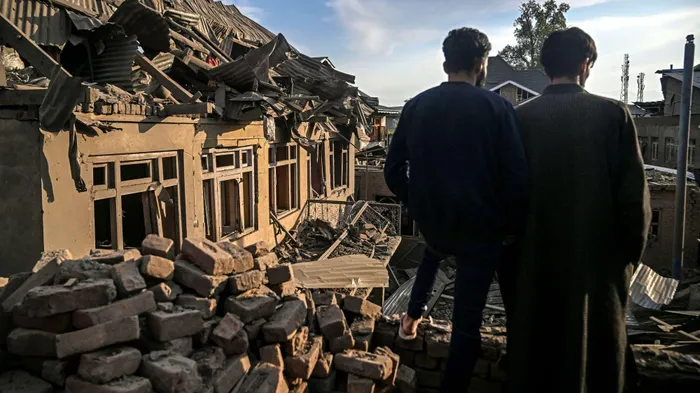Indian and Pakistani troops exchange fire overnight in Kashmir as relations hit new low

Soldiers in Indian-administered Kashmir on April 25 blew up the family homes of two men who police allege were among a gang that carried out the region's deadliest attack against civilians for decades.
Image: Tauseef Mustafa/ AFP
Indian and Pakistani troops exchanged gunfire overnight along the Line of Control (LOC) that separates the two countries in contested Kashmir for a second day running, the Indian army said on Saturday.
India's army said "unprovoked" small arms firing was carried out by "multiple" Pakistan army posts "all across the Line of Control in Kashmir" overnight from Friday to Saturday.
"Indian troops responded appropriately with small arms," it said in a statement. "No casualties reported."
There was no immediate confirmation from Pakistan, but the two sides had confirmed gunfire between their respective forces the previous night.
Relations between the nuclear-armed rivals have plunged to their lowest level in years.
New Delhi accuses Islamabad of supporting "cross-border terrorism" after gunmen on Tuesday killed 26 men in the worst attack on civilians in India-run Kashmir for a quarter of a century.
Islamabad denies involvement, and calls attempts to link Pakistan to the attack at Pahalgam "frivolous".
The United Nations has urged the neighbours, who have fought multiple wars in the past, to show "maximum restraint".
US President Donald Trump has downplayed the tensions, saying that the dispute will get "figured out, one way or another".
Kashmir has been divided between India and Pakistan since their independence in 1947. Both claim the territory in full but govern separate portions of it.
Rebel groups have waged an insurgency in Indian-controlled Kashmir since 1989, demanding independence or a merger with Pakistan.
Indian security forces have launched a giant manhunt for those responsible for killing 26 men at the tourist hotspot of Pahalgam on Tuesday, with police naming two Pakistani nationals among the fugitive gunmen.
On Friday Indian troops blew up homes in Kashmir in their search and issued wanted posters with sketches of three men.
Get your news on the go, click here to join the IOL News WhatsApp channel.
Islamabad denies involvement, and calls attempts to link Pakistan to the Pahalgam attack "frivolous".
"Any threat to Pakistan's sovereignty and to the security of its people will be met with firm reciprocal measures in all domains," a statement said, after Prime Minister Shehbaz Sharif held a rare National Security Committee with top military chiefs.
Pakistan's Senate on Friday passed a resolution condemning a "campaign by the Indian government to malign the Pakistan government".
Water treaty suspended
Indian Prime Minister Narendra Modi had earlier said his country would "track and punish every terrorist and their backer."
"We will pursue them to the ends of the Earth."
UN spokesman Stephane Dujarric told reporters in New York that issues between the countries "can be and should be resolved peacefully through meaningful mutual engagement".
Meanwhile US President Donald Trump downplayed the tensions, saying aboard Air Force One that the dispute will get "figured out, one way or another".
Kashmir has been divided between India and Pakistan since their independence in 1947. Both claim the territory in full but govern separate portions of it.
Rebel groups have waged an insurgency in Indian-controlled Kashmir since 1989, demanding independence or a merger with Pakistan.
Indian police say three of the gunmen are members of the Pakistan-based Lashkar-e-Taiba group, a UN-designated terrorist organisation, and issued a bounty for their arrest.
'Reduce it to dust'
A day after the attack, New Delhi suspended a water-sharing treaty, announced the closure of the main land border crossing with Pakistan, downgraded diplomatic ties, and withdrew visas for Pakistanis.
Islamabad in response ordered the expulsion of Indian diplomats and military advisers, cancelling visas for Indian nationals -- with the exception of Sikh pilgrims -- and closing the main border crossing from its side.
Pakistan also warned that any attempt by India to stop water supply from the Indus River would be an "act of war".
At the frontier, created at the end of British rule when the sub-continent was partitioned into Hindu-majority India and Muslim-majority Pakistan, distraught citizens crossed.
The measures have abruptly ended rare visits to see relatives separated for generations by the border.
Among those at the Wagah border leaving Pakistan was 39-year-old Ghaffar Musafir, who was returning to his home in Indian-administered Kashmir.
"I'm Indian, I love India, but my family is here", he said. "And it's not like I hate Pakistan -- I love Pakistan too".
Pahalgam marks a dramatic shift in recent Kashmiri rebel attacks, which typically target Indian security forces.
AFP
Related Topics: